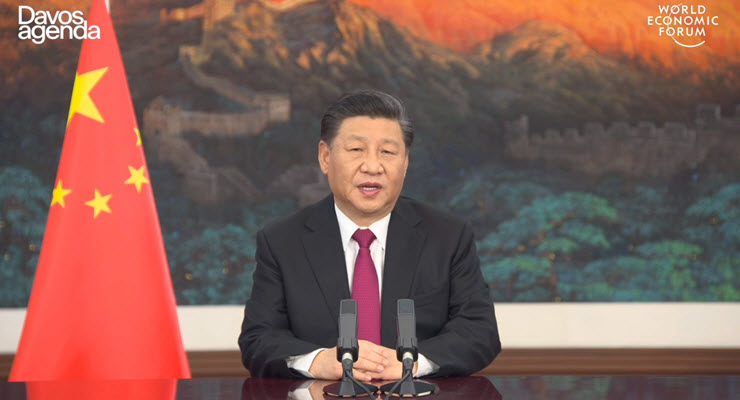
Chinese President Xi Jinping has warned global leaders about the prospects of a “new Cold War” that could “drive the world to division and even conflict”.
In a clear message to the Biden administration and its allies, he rebuked western critics of Beijing: “We should respect and accommodate differences, avoid meddling in other countries’ internal affairs and resolve disagreements through consultation and dialogue.”
Both here and around the world, Xi’s speech is getting plenty of scrutiny and interpretation. Here’s a selection.
The local view
Much domestic analysis of Xi’s speech focused, unsurprisingly, on the hypocrisy of China’s president preaching the gospel of free trade while blocking Australian coal, barley, beef and wine.
In the Nine newspapers, China correspondent Eryk Bagshaw labelled Xi’s speech “a masterclass in doublespeak”.
“Xi’s comments show that China will continue to paint itself as a victim despite its campaign of economic coercion against a country with GDP a fourteenth of its size,” he wrote.
The papers’ news write up of the speech leaned on quotes from “China hawks”, who said Xi’s words should not be taken seriously.
Over in The Australian, former China correspondent Rowan Callick noted that Xi “uses such set pieces to deliver messages designed to be heard differently by different audiences”.
Meanwhile, Liberal backbencher Dave Sharma, a critic of China, tweeted that Xi’s comments about the strong not bullying the weak and the importance of multilateralism were “welcome”, but added that he hoped they were “meant sincerely”.
The view from the States
But Xi’s speech was never really meant for Australia. Its obvious target was the Biden administration. Under Donald Trump, relations with China deteriorated, and while Biden may not pursue as blunt an approach to Beijing, there were plenty of warnings there for the incoming administration.
As Axios notes, the new administration has already taken a similar stance to Trump over China’s genocidal treatment of the Uyghurs and approach to Taiwan. The article also suggests Xi’s claim that multilateralism should not “devolve into small circles” could be in tension with Biden’s view of it as operating through alliances.
Elsewhere, there was a hint of optimism in the US media about what Xi’s speech meant. The Washington Post framed the remarks as a “call for unity” on fighting climate change and the coronavirus. CNBC also described Xi’s calls for unity, but pointed out that the speech heralded a competitive, assertive, and altogether “very different China” for Biden to deal with.
The New York Times, meanwhile, still trying to squeeze out the dregs of the profitable Trump years, saw Xi’s speech as “one more chance” for China’s leader to prove himself the antithesis of the former president.
Other allies
Elsewhere, responses to Xi’s speech have been far harsher. According to The Japan Times, the Davos address signals “no change in China’s course”, noting that while the speech was clearly targeted at the incoming Biden administration, Xi’s rhetoric appears unchanged from how he dealt with the Trump administration.
Meanwhile, a particularly brutal takedown comes in The Telegraph (UK), where international business editor Ambrose Evans-Pritchard writes that Xi’s “pitch for moral world leadership has reached the point of surrealist absurdity.”








Evans-Pritchard at the Daily Telegraph might better foist his comments about Xi’s ‘attempt at moral leadership’ on his own leader who has shown little if any and certainly “reached the point of surrealist absurdity” some time ago.
This is not in the slightest degree a fair overview of the world’s press. I mean, the Daily Telegraph – really?
The global reaction as quoted above appears to be limited to English language media from Australia, the US, (little) Mother England and Japan (just to show we’re not racists). I would be interested in the reaction from any of the ASEAN countries, or countries in the Southern half of the Americas, or perhaps from Africa.
As it is, this comes across as another piece of low value narrative pumping, replete with the usual memes and double standards, and, of course, utterly lacking in context.
It probably won’t be enough to bother the authorities in Beijing but products of theirs that were starting to penetrate our smallish market such as motor vehicles are unlikely to be helped by the present instability of relations. I might be in the market for a replacement for my Japanese vehicle in a couple of years and the well-presented Chinese MG vehicles are very attractively priced. With such instability in relations between our countries MG along with LDV and other brands might become orphaned brands, gone from the market and with parts difficult to source.
Good point. Though I suspect any concerns their auto industry might have will be secondary to other factors. Their tech sector trying to get their market access back for starters.
I actually couldn’t keep a straight face listening to Xi make that speech. I’m sure Xi is the only person on earth who could – while actually making the speech, because he seems totally incapable of facial expression at any time.
My son’s take was that Xi was suggesting to the whole world that China is by far the best at the sort of things he was demanding we should not do, so perhaps we should all just give up now.
Hilarious, if it wasn’t so sinister.
Actually the US does all of these things better than any other nation. This was a message to the US. It’s hard for Australia to take a moral highground in the spat with China. We made no attempt to use standard Diplomatic protocols and instead used “megaphone Diplomacy” at the behest of the US. The US uses sanctions as their primary “economic coercion ” tactics so as the 51st US State, China is just giving us a taste of what the US does to others.
It was a clear message that they wont be bullied by the West and the US in particular.